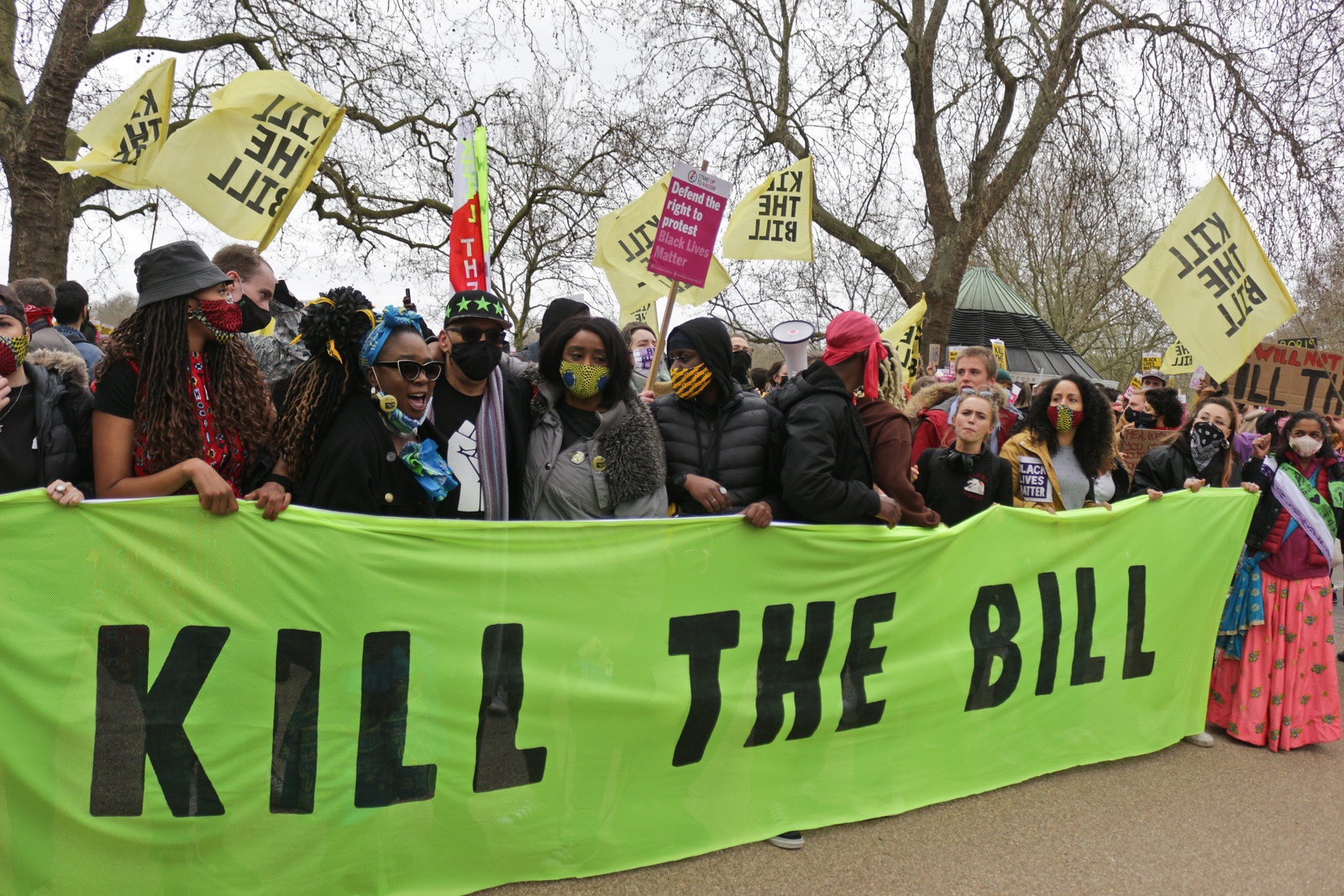Today’s Britain has been made poorer, less tolerant and less safe by the passing of the Police and Crime Bill. Its a piece of legislation noted for its largeness, its contentious section restricting the right to protest and its pushing through at a time when the nation’s civil liberties are further temporarily suspended as the pandemic is officially extended. In short, the Bill got it wrong.
Criticism of the Bill should not be left to the political left to fight, nor to activists or the media, who frame protesting as a limited right whilst a large portion of the UK press parrot the government line. The right to peacefully protest without prior warning is a human right. This right has been threatened and it has been taken away. This human right has been taken away by a government threatening our British liberal democracy. This human right to protest has been stolen from us, which must be repeated until this integral political, social, personal and legal freedom is restored.
One person protests have changed the world and continue to do so. Over the past century, there has been countless peaceful protest movements, successful due to their non-violence and fidelity to law. However, these protests in liberal democracies were able to come into fruition at the right time as they were free to choose where, when and how they could protest. Of course, these protesters have never been so free as to infringe on others’ rights, incite violence or invoke hate speech. All protests of any persuasion, that do not violate British Free Speech law with hate speech, should be bound by the same objective principle that people are free to organise and thus to protest without state approval.
Three years ago, Greta Thunberg did change the world, amidst a barrage of criticism – a lot of which was aimed not at her cause or her character. Greta is one of a long line of peaceful, law-abiding individuals who protest to be heard. Not to make mere noise, as suggested by the arrogant assumption of some that protests spring up just to be a nuisance. Alone, Greta was able to ignite a movement, bringing renewed publicity and strong enthusiasm to a complicated issue that requires attention and action from the whole world: climate change.
Greta was thrust into the spotlight — rightly or wrongly a teenage figurehead– but the reaction to her fame highlights how when the cause is popular, well-received and sensible to the public, the logistics, the personality, even the appearance of the protesters, instead become the irrelevant but influential criticism. Britain made international headlines for its Crime Bill before it even passed, as Britain has a reputation of having an overly powerful, protest-bashing press which hovers over the British right; one which is prone to a nasty streak including authoritarianism. Britain, therefore, was a candidate for intolerant, anti-democratic legislation and is now its test case example.
The Conservatives need not have passed such a rushed, overall divisive piece of legislation. Individual unthinkable laws such as static non-violent protests being subject to noise and time constraints were able to be ushered in under obtuse, ill-fitting comprehensiveness. The best hope is that if the House of Lords could sensitively separate policies this June, the Parliamentary majority have a democratic mandate for and policies that undermine underlying civil liberties that no government should be able to reverse.
The Police, Crime, Sentencing and Courts Bill is un-British, but this needs to be formally articulated. Both the democratic left and the right need to prove why it is wrong for all protests to be constrained by legislation rife for discrimination. It is clear why a protest against the police should never require the police’s formal, binding consent. Britain is no utopia. It has been a dystopic year and now is the time for more peaceful demonstrations as politicians waste our finite time to solving ticking crises.
Personally, I feel so strongly about protesting and I hope that the British public slowly awakens by the passing of this Bill; I hope that after the pandemic, dare I say it, they are not quiet. Protesting may not be synonymous with the so-called British character like other countries, but when the Conservatives’ ‘Law and Order’ rhetoric becomes a hurtful reality,
the political temperature rises. The stiff upper lip rises to a cross face. Indignation turns votes but, most pressingly, it can escalate to anger which overboils to violent protest. Riots can be reduced to paucity by the right to peaceful protest being upheld and heartily exercised.
Pragmatism prevails in the public, with there being rightful concern and debate around police powers to break up, say, public transport being blockaded but this intervention must always be after the fact. Police by consent means the interests of the protestors come first. Government, police and all officials, elected by people or not, are the ones who require permits to justify their existence and to hold them to account.
There should be no permission needed at all for one person, to march, to demonstrate, to protest any cause and if this individual act is legitimately unreasonable, only afterwards should the law then be applied to protect security, never to procure subjective political considerations. Protesting defends democracy and democracy forever needs defending. The Bill should still be killed.
Featured image via Steve Eason on Flickr.

